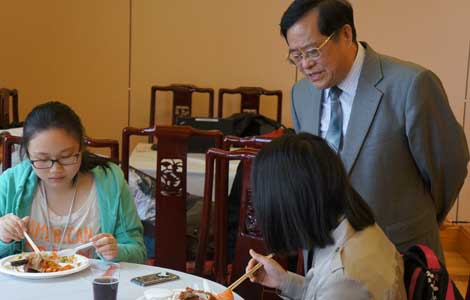Help on way for children in need
Updated: 2013-07-12 00:46
By HE DAN (China Daily)
|
||||||||
Guardianship measures drawn up after two toddlers starve to death
Measures are being explored to appoint new guardians for children whose legal guardians cannot take care of them, according to a ministry official.
The move comes after two toddlers starved to death in Nanjing, Jiangsu province, after their mother failed to provide for them.
The Ministry of Civil Affairs will allocate temporary shelters for children in care homes, foster families or other social institutions once they are found living with guardians who cannot take care of them, Li Bo, deputy head of the ministry's department of social affairs, told China Daily.
The department oversees social protection for vulnerable children.
Civil affairs departments will draw up an intervention plan jointly with public security and judicial authorities and local branches of the All-China Women's Federation in each individual case, Li said.
Under Chinese law, when a parent or other legal guardian fails to fulfill their duty or violates a child's rights and repeated education fails to change the guardian's behavior, "relevant individuals or institutions" can appeal to the courts to transfer guardianship.
"However, the law has not articulated which ‘relevant individuals or institutions' are qualified to request the courts to do so" Li said. "We also lack a clear judicial procedure for guardianship transfer."
Because of this, China hasn't seen any such transfers after guardians were found to have violated children's rights, he said.
Two Nanjing girls, aged 1 and 3, starved to death on June 21 after their mother, Le Yan, a suspected drug addict, locked them in their home for days.
In March, residents of the building saw the older girl running around half naked at about 5 am, and police who arrived at the building found her 1-year-old sister sitting on the apartment's toilet, her face covered with excrement. Their mother was not at home.
Since February, the local community had been providing a monthly living subsidy of 800 yuan ($130) for the family after the girls' father was imprisoned for sheltering drug addicts.
Community police officer Wang Pingyuan handed the money to the girls' mother and also checked on the girls every 10 days.
Wang Yu, a lawyer from Beijing Fengrui Law Firm, said she was furious over the "irresponsible mother" but added that local authorities had failed to act.
"I really doubt that such a mother would use a monthly subsidy of 800 yuan on her children. What difference would it make if the community police officer only checked on the children once every 10 days?" she said.
"Why didn't the community and local civil affairs bureau find another guardian for the girls before the tragedy?"
On June 26, Wang, together with four lawyers, wrote to the local civil affairs bureau, community committee, public security bureau and women's federation to ask whether they had asked a court to find another legal guardian for the girls.
Wang said she had not received a reply by Thursday.
Phone calls by China Daily to the public security authorities and community committee on Thursday either went unanswered, or interview requests were denied.
Pia MacRea, country director of the Save the Children China Program, a non-governmental organization focusing on children's rights and welfare, said, "Having a legal mechanism in place to transfer the guardianship of a child from living parents ... can be a critical legal last resort in situations where it is very clearly not in the best interests of the child to remain with the parents.
"However, taking a child from its parents is a powerful right of the State and should only be used judiciously, as a last resort.
"There must be good checks in the system. The question of what constitutes fitness to be a parent can be controversial," she said.
Li, from the Ministry of Civil Affairs, said it asked 20 provinces, municipalities and regions in May to launch pilot programs aimed at building a new social protection network for children.
The programs highlight a community-based monitoring and reporting mechanism for children in problem families, he said, adding that a "mature" plan will only be introduced after more research and field studies.
Tong Xiaojun, a professor specializing in child protection at the China Social Work Research Center at China Youth University for Political Sciences, urged the government to recruit more social workers.
"Well-trained social workers can assess the needs of children and their families and provide professional services," Tong said.
Shen Jiahui contributed to this story.
Most Viewed
Editor's Picks

|

|

|

|

|

|
Today's Top News
Constructive mood at Sino-US talks
China, Russia consider increasing naval drills
2 pilots called for Asiana to abort landing
Increased cooperation brings benefits
Japanese defense report lashed out
Lifesaving top priority, premier says
China's astronauts ready for challenge
Top GSK executives investigated
US Weekly

|

|













